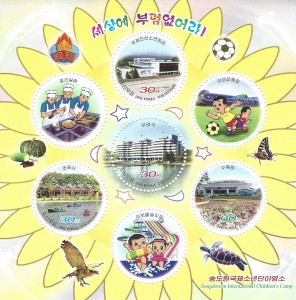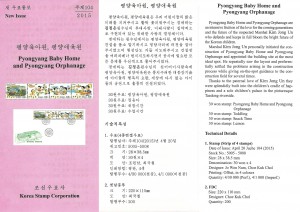UPDATE 3 (2015-8-20): Pyongyang Time reportedly causing confusion along inter-Korean border. According to the Korea Times:
North Korea’s new standard time is making it difficult for some South Korean firms operating in the Gaeseong Industrial Complex (GIC) to transport their goods on time to their customers in the South, officials here said Thursday.
The two Koreas have been missing hotline calls from each other since Saturday when the North’s regime unilaterally pronounced its new standard time by turning their clocks back 30 minutes behind the time zone in the South.
“The 30-minute time difference is making us late in transporting our goods produced at the GIC to our customers although we’re working under a schedule as usual,” a manager at a garment manufacturer in Seoul said, declining to be named.
The firm is one of 124 small and medium-sized enterprises (SMEs) that hire some 53,000 North Koreans at the inter-Korean industrial park in Gaeseong. The border city is about 53 kilometers northwest of Seoul.
According to the company, it has shipped products from the GIC via trucks every day at 11:50 a.m. This is one of the daily time slots set by the two Koreas for the South Koreans to enter or exit the joint industrial complex.
“The problem is that it’s 12:20 p.m. in South Korea. And we’ve seen that the 30-minute time difference can cause a significant delay in delivering the goods to our sub-contractors in Gyeonggi Province and those in the outer regions,” the manager said.
He added his company, which only operates factories in Gaeseong, may re-open a plant in the South, which was closed in 2004 when the GIC opened, if the government fails to settle the time-related issues.
“We decided to close our plant in the South to capitalize on cheap labor of skilled North Korean workers. Now is time to give a second thought,” the manager said.
Some other firms said the so-called “Pyongyang Time” does not have any impact on their business.
“We ship all components to assemble paragliders to our inventory in Yongin, Gyeonggi Province and we don’t see any difference before and after Pyongyang Time,” said a staff at Gin Gliders.
A public relations official for Good People, an underwear manufacturer, said only 2 percent of the firm’s products are from the GIC while the rest are made in Jeonju and Cambodia.
“We used to make 30 percent of our products at the GIC, but not any longer since 2013,” said the official, who has asked not to be named.
The operation hours of the Seoul-Pyongyang hotline have been from 9 a.m. to 4 p.m. on weekdays since 1992 when the two enemies set up the direct communication system using non-dial phones across the Demilitarized Zone (DMZ)
The Ministry of Unification said the North Koreans have not been picking their hotline phone set up at their side of Panmumjeom, the inter-Korean truce village at the DMZ, until 9:30 a.m. from Monday.
The unification ministry also said North Koreans have asked its officials to stay at Panmunjeom until 4:30 p.m. instead of pulling out at 4 p.m.
“We still begin work at 9 a.m. and call it a day at 4 p.m. in accordance with the Greenwich Mean Time (GMT)+9 time zone,” a ministry official said on condition of anonymity.
“And we obviously wouldn’t know how North Koreans will handle things in case of emergencies after our officials left for home.”
UPDATE 2 (2015-8-15): Pyongyang Standard Time has launched. According to Yonhap:
North Korea set itself a new time zone Saturday in a move expected to complicate relations with South Korea.
North Korea’s time zone is now 30 minutes behind that of the South.
“The Presidium of the Supreme People’s Assembly of the DPRK decided to set the standard time of the Republic with 127 degrees 30 minutes east longitude as a standard and to apply it from August 15,” the North’s official Korean Central News Agency said in a dispatch, referring to the country’s rubberstamp parliament.
DPRK is the acronym of North Korea’s official name, the Democratic People’s Republic of Korea.
North Korea marked the start of the new time zone by ringing the Pyongyang Bell at the Pyongyang Astronomical Observatory at the stroke of midnight, according to KCNA.
“At the same time, all industrial establishments, trains and ships across the country sounded sirens and whistles,” it said. “Service personnel of the Korean People’s Army on their duties of defending the country, scientists working on satellites to explore a new area of conquering space and all other people of the country set their clock and watches according to Pyongyang time amid excitement and delight at the national event.”
On Aug. 7, North Korea announced it would turn back its clocks by 30 minutes to rid itself of the legacy of Japan’s 1910-45 colonial rule of Korea.
South Korean officials have expressed concern the move will complicate inter-Korean affairs, particularly movements in and out of the joint industrial complex in North Korea’s border city of Kaesong.
It could also create confusion in messages exchanged between their militaries.
Here is coverage in KCNA.
Here are some interesting observations by Martyn Williams.
UPDATE 1 (2015-8-12): And the inter-Korean trash-talking over the new time zone has begun. According to the Yonahp:
North Korea slammed President Park Geun-hye Wednesday for condemning the North’s decision to push back its standard time by 30 minutes, saying that her remarks are “unpardonable.”
Park expressed deep regret Monday over Pyongyang’s unilateral move to push its clocks back a half-hour starting Liberation Day, which falls on Saturday. The North claimed that the move is aimed at removing what it called the vestige of Japan’s colonial rule.
Currently, the two Koreas use identical standard time, set under Japan’s 1910-45 colonial rule of the Korean Peninsula.
The North blamed Park for commenting on its decision, saying that what she said is an “unpardonable and politically motivated provocation.”
“All countries have their own standard time. It is the universally accepted practice in the world for each country to fix its own standard time as it is a matter pertaining to the sovereignty of an independent country,” said a spokesman for the North’s Committee for the Peaceful Reunification of Korea.
North Korea claimed its decision to fix the new standard time reflects its “firm faith and will” to make Japan pay for what North Korea called its “hideous crimes.”
The Unification Ministry has said that the North’s move is feared to deepen differences between the two Koreas and to run counter to efforts to promote inter-Korean cooperation and prepare for a peaceful unification.
The time differences could cause some logistical problems, such as the timetables at a joint industrial park in the North Korean city of Kaesong.
Seoul said that South Korea’s choice of the present time zone is based on practical benefits, such as daylight savings, rather than colonial history.
ORIGINAL POST (2015-8-7): According to KCNA:
Pyongyang Time Newly Fixed in DPRK
The DPRK decided to fix a new standard time on the occasion of the 70th anniversary of Korea’s liberation.
A relevant decree promulgated by the Presidium of the Supreme People’s Assembly of the DPRK on Wednesday noted as follows:
It was on August 15 when President Kim Il Sung, benefactor of national resurrection and peerless patriot, crushed the brigandish Japanese imperialists by making long journeys of anti-Japanese bloody battles and liberated Korea. It was the day of historical significance as it put an end to the history of national sufferings and brought about a radical turn in carving out the destiny of the country and its people.
The wicked Japanese imperialists committed such unpardonable crimes as depriving Korea of even its standard time while mercilessly trampling down its land with 5 000 year-long history and culture and pursuing the unheard-of policy of obliterating the Korean nation.
It is the firm faith and will of the DPRK’s service personnel and people to force the Japanese imperialists to pay for the monstrous crimes committed by them for a century, firmly defend the national sovereignty and demonstrate for eternity the dignity and might of the great Paektusan nation shining with the immortal august names of Kim Il Sung and leader Kim Jong Il.
The Presidium of the Supreme People’s Assembly of the DPRK made the following decision reflecting the unshakable faith and will of the service personnel and people on the 70th anniversary of Korea’s liberation:
Firstly, the time at 127 degrees 30 minutes east longitude or 30 minutes later than the present one shall be fixed as the standard time of the DPRK and called Pyongyang time.
Secondly, Pyongyang time shall be applied from Aug. 15, Juche 104 (2015).
Thirdly, the DPRK Cabinet and relevant organs shall take practical steps to carry out this decree.
The media has jumped all over this, so there is not much more to say. But here are my $.02:
NK is a very nationalist society, and the only country as vilified as the US is Japan. August 15 is not celebrated in NK as the end of WWII, but as the victory over Japanese colonialism (brought by Kim Il-sung, not allied forces)
The Kim Jong-un regime has placed a lot of significance on symbolism: Kim resembling his grandfather, building orphanages and water parks to show he cares about the people, etc. So moving the clock back a half-hour is an interesting move. High symbolic value (carrying out the revolution started by his grandfather), but it will not fundamentally deal with the key problems the regime is facing domestically and internationally.
It will also be something that North Korea can prod the south with: “You are still on Colonial time, not Korean time.” South Korea had also reverted to pre-colonial “Korea time” in 1954, but switched back to Japan time in 1961 under Park Chung-Hee (the current president’s father) who received aid from Japan was a US allly.
North Korea has been holding talks with the Japanese in recent years, but little progress has been made. Could this announcement signal that they are done trying with Japan?
As for implementation, this should not be too difficult. North Korea is a small country with a highly urbanized population. The government already controls what time people get out of bed in the morning with loud speakers and patriotic music. Since nothing in the DPRK is automated, there is not any computer code that needs to be adjusted. Finally, infrastructure in North Korea is so unreliable that being on time is not as big a deal there as it is in South Korea or other developed countries.


